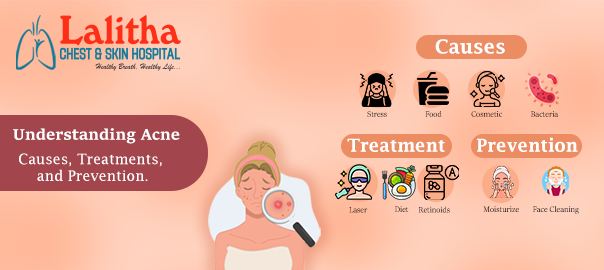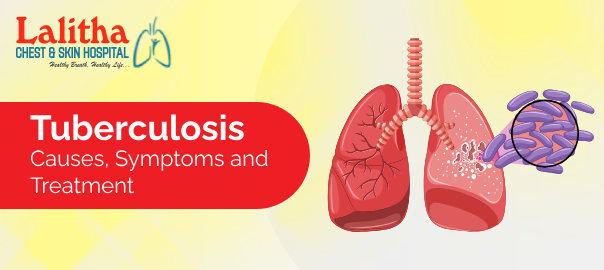Like every other cosmetic condition, acne varies among individuals, impacting people differently based on age, skin type, and even eating habits. For some, acne naturally subsides with age, while others have to tolerate it.
For few people, it is mild and manageable; for others, it may lead to ongoing self-consciousness and a heightened sense of insecurity. Some may notice a correlation with particular foods, stress, or other emotional strains, while for others, it may persist despite persistent attempts to address it.
In all the above cases, acne will result in body image issues, particularly in the younger generation. If you have had to bear the brunt of acne and are experiencing skin-related issues, you must improve your awareness and take the proper steps towards acne treatment in Karimnagar.
In today’s blog, with insights from the best dermatologist in Karimnagar, Dr. B. Jyothi, let us know about this common yet harrowing skin condition.
What causes acne?
Acne is one of the most common skin conditions that affects every person at some time. Its intensity may vary from person to person. Still, it is the most common skin condition, leading to numerous searches for “best skin specialist near me” and “best dermatologist near me” on Google.
There is no single cause for acne outbreaks, which is precisely why many people are impacted by acne at one point or another. Some of the most documented causes of acne are as follows:
Overproduction of Sebum: Facial skin naturally produces sebum, a natural moisturizer and skin guard. However, when sebum is produced excessively, it may mix with dead skin cells to clog hair follicles, triggering acne on facial skin.
Hormonal Changes: Fluctuations in hormones like estrogen, progesterone, and testosterone may also cause acne. These hormonal fluctuations trigger more sebum production, increasing the risk of acne on the face.
“Acne due to hormonal dysfunction is more noticeable in puberty. Even adult women can suffer from hormone-related acne during menstruation,” says a dermatologist at Lalitha Chest and Skin Hospital in Karimnagar, Dr. B. Jyothi,
Stress: Individuals with normal sebum production and hormone levels can also develop acne when their stress levels increase. These stress levels can increase sebum production, triggering inflammation in the skin and weakening the skin barrier function, leading to acne. In addition to this, stress can disrupt sleep patterns, lead to overeating, and even lead to acne picking, which further exacerbates acne.
Specific Skin Type: Certain individuals, without stress or hormonal fluctuations, can also suffer from acne because of their skin type. “In most cases, people with combination skin types suffer a higher risk of acne than people with dry skin, primarily because they are more prone to produce excessive sebum,” according to a cosmetologist at Lalitha Chest and Skin Hospital, Dr. Jyothi.
Propionibacterium acnes: Bacteria that live on the skin may also cause acne when it is excessive enough to clog pores.
How to prevent acne?
As you may have seen, the primary reason for acne is the excessive production of sebum, which goes on to clog pores. The most practical way to prevent or even reduce the chance of acne is to avoid this from happening, and there are four different ways one can reduce the risk of acne:
- Regular Cleansing of Facial Skin: Over the day, a layer of dirt and oil masks our skin, which eventually mixes with dead skin cells to cause acne. It is advised to cleanse the facial skin twice daily to remove these excretions and prevent acne. Clean skin reduces the risk of acne by reducing excessive sebum and bacteria on face.
- Use Mild Non-Comedogenic Products: While regular cleansing can help, excessive cleaning can worsen the situation by drying out the skin. “People, without knowing, use harsh cleansers which can harm the skin and intensify acne. We also advise using mild non-comedogenic cleansers for facial cleansing,” says a dermatologist in Karimnagar, Dr. B. Jyothi.
- Avoid Touching Face: Besides excessive sebum production, bacteria is another cause of acne. Most people pester their acne and pick at them, which may spread the bacteria and cause acne breakouts in other parts of the face. So, please avoid touching your face frequently.
- Make Healthy Lifestyle Choices: Excessive consumption of processed food, heavy oils, stress, and an inactive lifestyle are significant causes of acne in teenagers, according to skin specialist in Karimnagar Dr. B. Jyothi. Leading a stress-free life with a healthy diet and adequate exercise can reduce inflammation, promote blood circulation and thus reduce the risk of acne.
In the few cases where even all the intervention tips can prove less useful. Our dermatologists at Lalitha Chest and Skin Hospital in Karimnagar have encountered several acne cases where the prevention steps fall short. Fortunately, our dermatologists have successfully helped these patients with a diverse array of acne treatments.
What are the treatments for acne?
“Treatment for acne at Lalitha Chest and Skin Hospital is personalized based on the exact cause, severity, lifestyle, and medical history of the patient,” says Dermatologist in Karimnagar Dr. B. Jyothi.
Our treatment options for acne at Lalitha Chest and Skin Hospital in Karimnagar include topical and oral medications for mild and less severe cases. Our dermatologists leverage also advanced laser treatments for acne cases involving deep cysts and skin scarring. The laser treatments reduce inflammation, kill bacteria, and promote collagen production to restore skin health.
Light therapy is another acne treatment our dermatologists use at Lalitha Chest and Skin Hospital in Karimnagar. This advanced procedure uses light at a specific wavelength to control and treat moderate acne by killing bacteria and reducing inflammation. In addition to these procedures, our dermatologists in Karimnagar are experts in performing extractions, chemical peels, and microdermabrasion, which are quick, easy, and effective ways to treat acne.
If you are still searching with “best dermatology near me” and “skin specialist near me” queries in Google, please rest assured. Lalitha Chest and Skin Hospital has the best dermatologists in Karimnagar who leverage their expertise and advanced facilities to treat every type of acne effectively. You can contact us here.



